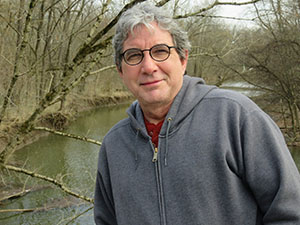HEAD ABOVE WATER
★ ★ ★ ★
A DAY TO REMEMBER

Photo by Ivana Cajina
By Tim Clark
Recently I was fortunate enough to participate in the NAMI (National Alliance on Mental Illness) 5K walk. It is a fundraiser, some people pledge money and other people walk, a partnership of sorts. It is more than that, though, it is a truly noble, almost impossible effort to raise awareness and acceptance of mental illness. “End the Stigma” was this year’s theme.
I was there because the family of a friend of mine has been touched by mental illness. Her quiet resolve and inner strength are inspiring. I haven’t managed to raise a lot of money but I have received donations from New Zealand and Great Britain which has to be some sort of accomplishment. I donate to my wife and she donates to me so we don’t go empty handed. And we walk.
The walk takes place at Wolfe Park, an appropriate place, on one side are the wealthy, with sprawling homes, lawn services to care for their stunning lawns, neat, laser-cut hedges, manicured bushes and award-worthy gardens. Cross the tracks and there are the people living on the edge, rundown buildings, bodegas and a painful lack of hope. There are fewer places in the city with such stark contrast and mutual exclusion, so similar to the feelings regarding mental illness.
It was crowded, but most of the people walking seemed to be similar to my friend, directly affected by mental illness. They had the dry, clinical, tired look of resignation. A look born of long years struggling against terrible odds and suffering, carrying the invisible scars of a pain born from watching a loved one battle impossible demons. Why? Why aren’t more people involved? The numbers are telling; one in five adults experience mental illness in a year, forty-six percent of homeless people are suffering from mental illness. It goes on, deeper, darker, worse: ninety percent of children who die from suicide are suffering, mostly in silence, from a mental illness. Clearly, mental illness needs a better marketing firm.
I walked, and I listened and watched, and I realized that many of the people were walking because it was also a safe place. There was no judgement; this was a village, a gathering. Nobody here was going to offer the canned, trite, suck-it-up, walk-it-off advice. It was a beautiful sight, so many people taking the time to support a cause. People representing the strata and variety of humanity. Wealthy, poor, immigrants, mental illness, like any illness, knows no boundaries. But, hope for the future drove them, and it was wonderful to watch.
I was moved by the amount of anguish, and the laughter, and the hope. And I cursed society for making these people who have lost so much feel guilty about the loss. As I walked, and listened and talked to the volunteers it struck me how many people were affected by mental illness. And how much of a fight it could be for families to get help, how hard they had to work to find treatment. And I was amazed at the resilience of humanity, the ability to overcome. But, it was frustrating to understand the battle necessary to get help.
It was obvious that in some places it is treated as weakness, not illness. Who gets the right to decide which diseases are real, and which are just the result of a negligent approach to life? It is obvious that there are those people who think of mental illness as a choice. Depression is just a lack of effort. “You should go out and get yourself a real ailment.” Who wouldn’t want that kind of Cafeteria Style Health Benefit?
“I’ll take something easily diagnosed and treated, please. Throw in a side dish of sympathy and prayers. And my wife will have the same.”
“Oh, excellent choice, sir. Might I suggest an expensive, out-patient procedure with minimal scarring?”
The longer I walked, and the more my mind raced to think of the last time I had seen anything about helping the mentally ill the more hopeless it seemed. I would walk, and sweat, and nothing would change. Several press organizations had representatives there, but it would get a few minutes, a photo on a back page, and a couple of words. And it would be over.
It would make no difference, nothing would change, it felt hopeless.
Several feet in front of me people were flowing around an obstacle, the path of least resistance. It was an older lady, dressed in stylish golf clothes with a NAMI Walk t-shirt over her blouse, and the heat and exertion were too much for her. She was stumbling and swerving and angry.
“I don’t need your help.” And people moved away, as though it were contagious.
A woman whose manner and gait and quiet ability to corral her sons with a few words suggested this was not her first visit to this event, grabbed the woman by the shoulder and pinned her softly against her hip to hold her up.
“I don’t need any help,” the woman said.
“I’m not helping you. I’m just walking with you,” she said, kindly. It worked, the older lady calmed down.
The woman held her up the rest of the way, talking pleasantly, asking questions. She sent her young children ahead to the first aid station to get a wheelchair. But they came back with the sad news there were no wheelchairs. It made me fume. They never thought to ask why these kids wanted a wheelchair.
I ran ahead myself and told the attendant that they had to go help. There was a woman in distress. And they did. But I lost sight of the kind woman in the mass of humanity, everybody wanted to help by then.
I felt bad, I wanted to tell her how moved I had been by her kind, selfless act. I realized that even a little thing is better than nothing. In the end I did see her, on my last lap, and thanked her.
“I just did what needed to be done,” she told me.
“Nobody else did it. You are my hero,” I said, and she smiled and patted me on the shoulder.
And in the end if you all you can do is not very much you should still do it. Someday it might make a difference. Never think you can’t help, remember the words “I just did what needed to be done”. If we all do that we can save the world.
I’d like to thank the editors of The Wild Word for letting me write this. If you can help here are a couple of links. And I’d really like to thank you for reading this, it probably wasn’t easy.

Tim Clark lives in Columbus, OH, where he works for a small warehouse. He is proud of his marriage, but he would have to ask his wife how many years it has been. He has a blog about life and the perils involved. You can see it here, Life Explained. He writes occasionally and with pride for Street Speech, a local homeless advocacy newspaper. He is contributor for Mercurial Stories, Writer’s Newsletter, Cross and Bull Stories, and has stories in anthologies from SmartyPants Publishing and the coming edition of Blank Tapes. He is particularly vain about his monthly column on The Wild Word. He is working on his first novel, based on a series of short stories, random memories, and imagination.

DEAR READER
At The Wild Word we are proud to present some of the best online writing around, as well as being a platform for new and emerging writers and artists.
If you have read the work in The Wild Word and like what we do, please put something in our tip jar.
THANK YOU FOR YOUR SUPPORT!
























“And I cursed society for making these people who have lost so much feel guilty about the loss.” Such a good point. Thank you for using your platform to be a voice for others, for doing your part.
I spend a lot of time cursing society, so far it hasn’t accomplished much. But, we do what we can, yes?